 Much is made in our industry of the importance of investing in the improvement of physical capital. And it is fair to say that a fair correlation, and likely causation, exists between venues with superior premises and superior business performance. There are plenty of case studies out there supporting the notion that the hospitality business with the best gaming machines, best car parking, and freshest fit-out will also boast the best earnings.
Much is made in our industry of the importance of investing in the improvement of physical capital. And it is fair to say that a fair correlation, and likely causation, exists between venues with superior premises and superior business performance. There are plenty of case studies out there supporting the notion that the hospitality business with the best gaming machines, best car parking, and freshest fit-out will also boast the best earnings.
But what about the need to invest in human capital? In a world with finite economic resources, our capacity to repeatedly redevelop our facilities to the tune of millions of dollars is limited. Particularly when we consider the soft economic environment, rising overheads and the challenge of striking the balance between investing in commercial projects and quarantining cash as a buffer against a market downturn.
It is possible for venues to get a competitive edge, even in the absence of the substantial dollars required to embark on major capital works. All that’s required is the foresight to recognise the importance of your people and the commitment required to invest in their development – performance planning can be the key to this.
Great people are hard to find. They’re even harder to retain. And even if we can find them and retain them, the real challenge is harnessing their skills, abilities and experiences such that they yield maximum value for the business. To achieve that with even one individual is a challenge, to achieve it with your whole management team is the key to establishing and maintaining a high performance culture.
Even in the best venues, where every member of staff has a job description and every department has an operating manual, it’s hard to describe them as having a high performance culture. Sure, people perform their roles and tasks are completed correctly, but (except in the case of an outstanding individual), it’s unlikely that your management team are curious and questioning, analysing and challenging, striving to develop themselves and excel at their roles to make your venue the very best. To achieve that requires some performance planning tools and processes.
Performance planning should be a collaborative process between the individual and their manager or mentor aimed at aligning individual goals with those of the business. The aim, of course, is to set some goals for the person and map out the steps to achieve those goals.
In a perfect world, our high skilled employees would come to work each day and perform with metronomic consistency. In reality, people are… well, people. They’re human, with all the various human frailties of emotions and inconsistency and fluctuating motivation. When we’re setting goals with our team, we want to strike a balance between:
- Capitalising on the person’s strengths so that the items contained within their performance plan represent immediate benefit to the organisation.
- Setting improvement targets for areas that you feel the person needs to develop in order to achieve the required standard.
- Allowing the person to set development goals that motivate them – things they are interested in and will keep their attention.
- Including aspirational items like ‘innovation’ and ‘values’.
Once you and your team member have developed that list, it’s important to include them in a structured performance plan.
The performance plan should be weighted. The most important items should carry the heaviest weighting and result in the greatest value being added. Less important items carry a lighter weighting. The weighting is a simple percentage. If an item carries a 10% weighting, the person should spend an average of 4-5 hours per week working on that area of their plan.
The plan should outline the specific objective for each area of responsibility and include a series of actions for the person to take to achieve those objectives. This is where the bulk of the content should be in a performance plan. After all, this is not about airy-fairy KPIs, KRAs, KPOs… it’s about action, so spell out clearly what those actions are. These actions are the things that your staff member will be accountable for. Completion of the action column of the plan is the pathway to success.
The plan should also include deadlines and a source of measurement. Ideally, performance plans should be reviewed and updated every 3-6 months, so deadlines should be within that period. Sources of measurement might include the P&L, a mystery shopper report, staff turnover reduction, achievement of labour benchmarks or COGS targets.
Once the plan is documented, it should become a living document, referred to daily, notes scribbled in the margins, bullet points added, questions asked. You’ll be able to tell who’s bought into the performance planning process by how their plan looks at the end of 3-months. Good staff members’ plans will be torn, dog-eared, coffee stained and covered in graffiti. The person whose plan looks pristine at the end of three months is paying lip-service to the process.
The crucial step in keeping the document relevant and top-of-mind is the coaching and mentoring that accompanies the plan. The mentor needs to facilitate regular one-on-one meetings with the person. The performance plan is the agenda for your discussions and minutes should be taken for the meeting.
The weekly one-on-one meeting might take 20-minutes one week and 2-hours the next. You might discuss the plan exclusively or you might discuss a whole range of issues from work-related to life more generally. An effective mentor takes interest in the person and recognises that for that person to achieve at a high level they need to be achieving success in other aspects of life too – family, health, etc. The one-on-one should celebrate small wins and devise how to overcome non-achievements.
You’ll know that the high performance culture has been established and cemented when you start to hear your team discussing their plans with each other; when your team start really having input into the content of their plans; when the majority of the talking in the weekly one-on-one meeting is by them, not you; and when the person shows up early to the meeting, keen to share their successes with you.
DWS has the tools and the expertise to establish and develop a performance planning system in your venue. If you feel that you could benefit from increased investment in your management team’s development, contact Tom Streater – tom@dws.net.au or 0439 940 007



